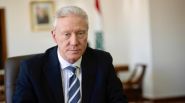UAE Denies Accusations of Supplying Chinese Weapons to Sudanese Paramilitary Forces
- 09/05/2025
- 5 comments
- 36
- 125


This is Beirut 11:30

Moncef Ait-Kaci 11:00

This Is Beirut 08/05 21:50

This Is Beirut 08/05 19:50

This is Beirut 08/05 17:20

This is Beirut 12:45

This is Beirut 12:02

This is Beirut 11:25

This is Beirut 10:25

This is Beirut 05:30
This is Beirut 08/05 21:53
This is Beirut 08/05 17:25
This is Beirut 08/05 14:40
This is Beirut 08/05 12:20

This is Beirut 08:05

This is Beirut 08/05 23:20

This is Beirut 08/05 19:40

This is Beirut 08/05 19:35

Christiane Tager 07/05 22:15

This is Beirut 12:00

This is Beirut 08/05 13:10

This is Beirut 08/05 12:20

This is Beirut 08/05 10:00

This is Beirut 07/05 21:15

Makram Haddad 09:30

This is Beirut 08/05 20:05

Makram Haddad 08/05 12:35

This is Beirut 08/05 12:20

This is Beirut 08/05 08:00

This is Beirut 08/05 15:15

Bélinda Ibrahim 07/05 12:00

Makram Haddad 02/05 15:05

Bélinda Ibrahim 30/04 15:00

This is Beirut 30/04 12:55

par Ici Beyrouth, 12:40

par Ici Beyrouth, 12:24

par Ici Beyrouth, 12:00

par Ici Beyrouth, 11:51

par Ici Beyrouth, 11:45